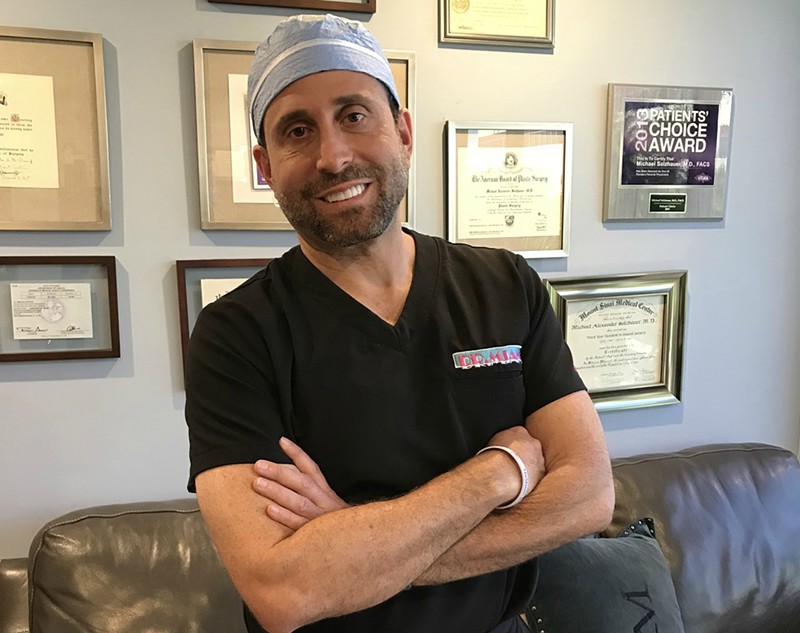Update, April 14: The Miami Film Festival was canceled because of the coronavirus pandemic. Instead, They Call Me Dr. Miami will be available to rent at home via Vimeo on April 25. A live Q&A session with Dr. Miami will be hosted on the film festival's Instagram account — @miamifilm — April 26 from 6 to 6:30 p.m.
You might know him as the plastic surgeon who Snapchats the tummy tucks, nose jobs, Brazilian butt-lifts, and penile enhancements of willing patients. Maybe you've seen him on his reality show or heard about him from the rappers 2 Chainz and Future.
But if you don't know him, he'll soon make his debut at the Miami Film Festival in March. Dr. Michael Salzhauer, better known as Dr. Miami, is getting his own documentary.
"It's probably the greatest documentary that was ever made," Salzhauer says.
In They Call Me Dr. Miami, you'll get a glimpse of the man you see on Snapchat dancing and clowning around in the operating room for his millions of social media followers. You'll also get an intimate view of his life outside his Bay Harbor Islands office.
"I knew how entertaining he could be, but I was more interested in his contradictions," says Jean-Simon Chartier, a Canadian documentary filmmaker who directed the feature film. "I knew he was an Orthodox Jew, that he had five children, and that he was married [to] the same woman he met when he was 17 years old. How could he manage to be this man and Dr. Miami at the same time? That was my starting point."
The documentary trailer shows Dr. Miami taking photos with women on a throne in his office and various hip-hop and rap artists sitting in on surgeries. It also depicts Salzhauer taking a walk with his wife, eating dinner at home with his family, and going to temple.
Salzhauer says work-life balance is important to him. Making time for the important things outside of his job requires work too, but it's necessary. He says his religion is a critically important aspect of his life.
"If I didn't have a religious outlook, if God wasn't real to me, I don't know how I could do it," he says. "I don't know how anyone can do it, really. There's just too much going on. You get caught in an existential, nihilistic whirlwind."
He says he's excited to see the documentary on the big screen. Having five kids, he hasn't seen a movie that isn't animated in quite a while.
"It's very intellectual, probably much deeper than me," he says. "[The filmmaker] tried to explain to me this vision about describing the spectacle of what our culture has become and how social media has infiltrated and changed the way we think about each other — and that plastic surgery was one of those nexuses."
Chartier learned about Dr. Miami in 2016 while working on a TV documentary for CBC/Radio-Canada, the Great White Norths' public broadcaster, about cosmetic surgery and society's obsession with beauty and youth.
"I was instantly fascinated with him," Chartier says. "I couldn't believe what I was witnessing: a surgeon filming his procedures live on social media; patients willing to be filmed with their breast or tummy open and their flesh hanging out; a doctor using his operating room and clinic to do skits featuring hip-hop music; thousands of people connected every day on Snapchat to consume this content. I was shocked and confused."
Dr. Miami's cameo in that earlier documentary lasted about three minutes. But Chartier says he knew he had come across a character who could be the focus of another film.
Chartier understands Dr. Miami is someone loved by followers and emulated by other doctors while he's disliked by critics for promoting plastic surgery at a time when society is questioning and dismantling beauty standards.
"When Dr. Miami says that beauty is power or that cosmetic surgery can change lives, I believe that he means it," Chartier says. "And I don't judge him for that even though I don't agree with a lot of what he promotes and how he does it."
The documentary also delves into critiques of cosmetic surgery and beauty obsession.
"I absolutely don't want to promote plastic surgery," Chartier says. "I think that our obsession with being recognized — being popular, beautiful, liked — puts a lot of pressure on young women in particular. And some of them are risking their health and lives by going under the knife. The film addresses that as well."
They Call Me Dr. Miami. 9:40 p.m. Thursday, March 12, and 8:20 p.m. Saturday, March 14, at Silverspot Cinema, 300 SE Third St., Suite 100, Miami. Tickets cost $16 via miamifilmfestival.com.

Audio By Carbonatix
[
{
"name": "Air - MediumRectangle - Inline Content - Mobile Display Size",
"component": "19274298",
"insertPoint": "2",
"requiredCountToDisplay": "2",
"watchElement": ".fdn-content-body",
"astAdList": [
{
"adType": "rectangle",
"displayTargets": "mobile"
}
]
},{
"name": "Editor Picks",
"component": "17482312",
"insertPoint": "4",
"requiredCountToDisplay": "1",
"watchElement": ".fdn-content-body",
"astAdList": [
{
"adType": "rectangle",
"displayTargets": "desktop|tablet"
},{
"adType": "rectangle",
"displayTargets": "desktop|tablet|mobile"
}
]
},{
"name": "Inline Links",
"component": "18711090",
"insertPoint": "8th",
"startingPoint": 8,
"requiredCountToDisplay": "7",
"maxInsertions": 25
},{
"name": "Air - MediumRectangle - Combo - Inline Content",
"component": "17482310",
"insertPoint": "8th",
"startingPoint": 8,
"requiredCountToDisplay": "7",
"maxInsertions": 25,
"watchElement": ".fdn-content-body",
"astAdList": [
{
"adType": "rectangle",
"displayTargets": "desktop|tablet"
},{
"adType": "rectangle",
"displayTargets": "desktop|tablet|mobile"
}
]
},{
"name": "Inline Links",
"component": "18711090",
"insertPoint": "8th",
"startingPoint": 12,
"requiredCountToDisplay": "11",
"maxInsertions": 25
},{
"name": "Air - Leaderboard Tower - Combo - Inline Content",
"component": "17482313",
"insertPoint": "8th",
"startingPoint": 12,
"requiredCountToDisplay": "12",
"maxInsertions": 25,
"watchElement": ".fdn-content-body",
"astAdList": [
{
"adType": "leaderboardInlineContent",
"displayTargets": "desktop|tablet"
},{
"adType": "tower",
"displayTargets": "mobile"
}
]
}
]












